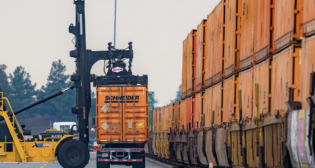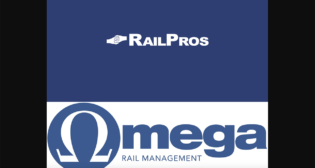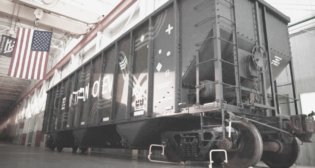
API emphasizing collaboration, not confrontation
Written by William C. Vantuono, Editor-in-ChiefThe American Petroleum Institute (API), which represents all segments of the U.S. oil and natural gas industry and whose more-than 580 members produce, process, and distribute most of the nation’s energy, early on was perceived as being critical of rail safety and of attempting to place blame on the railroads for the accidents. Indeed, an API spokesperson told Bloomberg News the day the National Transportation Safety Board published recommendations for inspecting and classifying crude oil shipments, “The first step is to prevent derailments by addressing track defects and other root causes.”
Yikes!
The API has been accurately described as a powerful lobbying group. Whether its spokeperson’s unfortunate, confrontational statement resulted from being cornered into a defensive posture by an ambitious reporter looking for a juicy story, by a general (and perhaps understandable) lack of knowledge about railroad operations and the industry’s overall excellent safety record, by being part of a culture of arrogance that sometimes grips large, power-wielding organizations, or some combination of all three, is unclear.
In the heat of controversy, people early on often—and irrationally—take sides, instead of sitting down together and saying, “How should we address this problem?” Psychologists say the “fight or flight” mechanism, the “survival instinct,” which evolved to protect our ancestors from danger, is still hard-wired into our DNA. Eventually, most of us learn to settle down and seek common ground. After all (aside from some NASCAR fans), who really wants to see accidents and mayhem?
This morning (Feb. 20, 2014), I received a statement from the API that indicates the U.S. oil industry—which, like the rail industry, clearly stands to benefit from CBR—seeks a more collaborative approach toward ensuring that crude oil moves by rail as safely as possible. As those of us in the rail industry have understood for years, safety goes straight to the bottom line.
The API’s statement, the release of which followed a recent meeting with U.S. Transportation Secretary Anthony Foxx and attributed to API President and CEO Jack Gerard, is worth repeating verbatim. A close read indicates, at least to me, that the API and the Association of American Railroads have been engaging in some much-needed dialogue. If such dialogue has been productive and educational for both of these stakeholders (not “sides,” because where safety is concerned there is no taking sides), all for the better:
“The oil and natural gas industry continues to work collaboratively with the Department of Transportation and America’s railroad industry to improve rail safety. Safety is always our top priority. We are working closely with the regulators and the railroad industry and looking in a holistic way at how to prevent accidents, mitigate impacts if they occur, and support emergency response.
“While nearly all rail shipments reach their destinations without incident (it’s 99.998%, according to the Association of American Railroads), our common goal should be zero rail incidents. All options must be considered to reach this goal. Prevention efforts should examine issues like track maintenance and Positive Train Control. Our mitigation efforts are looking at topics like tank car design and crude oil testing and classification. And a review of emergency response is examining ways to improve training and communications for emergency responders.
“We are committed to using the best science, research, and real-world data to make measurable improvements to safety. A holistic approach based on sound science and data will ensure that any changes to existing standards and practices achieve real safety improvements and do not shift risk to other areas. It is critical that our actions actually improve safety and reduce risk.
“API is taking the following actions to improve safety in a collaborative and holistic way:
“API has assembled top experts to develop a comprehensive standard for testing, classification, loading, and unloading of crude oil based on the best available science and data. PHMSA has committed to participate in this effort aimed at ensuring crude oil is packaged and shipped safely and appropriately. API’s standards are accredited by the American National Standards Institute, the designated standards authority in the United States and the same organization that accredits similar programs at several U.S. national laboratories.
“API continues to work with PHMSA and other representatives from the Department of Transportation to share information and expertise on crude oil characteristics.
“API has helped to lead the effort to improve tank car design. Our industry has been building next generation tank cars since 2011 that exceed federal standards. These new cars make up nearly 40% of the crude oil tank car fleet and will be 60% by the end of 2015. API is engaged in a holistic and data-driven examination with the railroads and railcar manufacturers of whether additional design changes would measurably improve safety without shifting risk to other areas.
“API is working with the railroads to enhance emergency response training through Transportation Community Awareness and Emergency Response. Known as TRANSCAER, this organization is a voluntary national outreach effort that assists communities in preparing for and responding to incidents.”
Now, a cynic may say, “Oh, that’s just public relations b______t.”
I don’t think so. True, it’s human nature to want to protect our own territory and shed good light on ourselves, and that’s perfectly fine, provided there is no ill intent (a concept politicians need to embrace). If, in the process of communicating an agenda or a position, conditions actually improve (in this case, improving the safety of crude oil by rail, one long-term side benefit of which is energy independence), it’s all for the better.
I’ll end this piece with a plug for Railway Age, if you don’t mind. A good way to keep the dialogue going would be to participate in our first Crude by Rail conference, to be presented at the Key Bridge Marriott in Arlington, Va., June 12-13. Click here for details.



